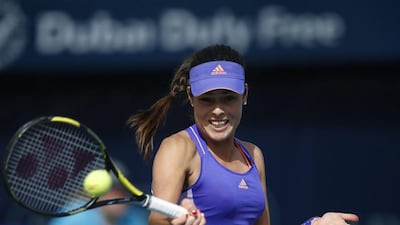Former world No 1 Ana Ivanovic destroyed Sabine Lisicki of Germany 6-0, 6-3 to advance to the third round of the Dubai Duty Free Championships where she will meet the Czech Karolina Pliskova.
Despite the comfortable nature of the win, Ivanovic revealed she still had doubts coming into the match.
“It was very hard going into the match knowing she already had a match and it was the first match for me in a month,” she said. “I also didn’t know how I was going to feel out there. I tried to focus on my game and what I had to do out there. I was pleased to use the opportunities early on, and that kind of set the tone for the match.”
RELATED:
- The 10 players to watch at ATP Dubai Duty Free Tennis Championships
- Wozniacki goes sandboarding, Ivanovic visits Miracle Gardens
- Simona Halep enjoys camel ride through the Dubai desert -video
The World No 5 simply blew her opponent off the court in the first set, cruising to a 6-0 lead in less than 30 minutes.
Throughout a match played in 32C heat, the 28th-ranked German had no answer to Ivanovic’s aggressive net play and superb forehand. Lisicki, who had hit 16 aces in her first match, couldn’t muster a single one in her second.
“I really felt like she did struggle a little bit with her serve. She made quite a lot of double faults,” Ivanovic said. “I tried to be aggressive, and probably she had that in her mind, because even when she was putting in a first serve I felt like I was handling it quite well and I was very aggressive on her second serve. So I think that kind of put pressure for her to go for more.”
The Serb started the second set in similar fashion to take a 2-0 lead, with Lisicki finally getting on the scoreboard in the ninth game of the match. The renaissance proved short-lived as Ivanovic overcame two break points to win the next match and lead 3-1, and then 5-1.
Lisicki put up a spirited fightback to win the next two games, saving a match point in the process, but Ivanovic broke her serve again in the ninth game of the match to close out the match.
A smiling Ivanovic said the afternoon heat had not had too much of a negative effect on her.
“It was hot, but it’s a dry heat so it’s actually better,” she said. “You know, I was spending time in the cold so it was a nice change. I took some time to get used to it. I struggled the first few days, but today I was fine.”
Follow us on Twitter @NatSportUAE

